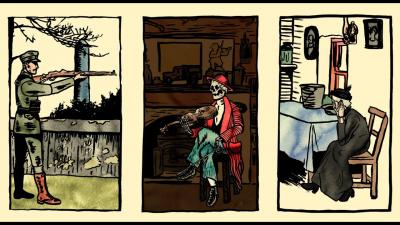Turning of the Tithe - Sophie Daly
Turning of the Tithe
As a young person growing up in Ireland, Sophie was struck by the political landscape in her own decade which saw seismic changes in legislative freedoms from the repeal of the 8th Amendment, 34th amendment which acknowledges same sex marriage and the Admissions to schools act 2018 which states that religion cannot be used as a barrier to education in a multi faith society.
Working with the commemorative timeline with an eye on the present and the past, Sophie was interested in the somewhat muted records of women, especially mothers who had lost sons either directly or indirectly as part of this conflict who’s voices whispered on rejected applications for pensions, there seemed like the grief had nowhere to rest. There is public opinion that says mothers of soldiers “allow” their sons to go to war. No decision on behalf of the life of one’s child comes easy. In this animation, Sophie compares the plight of these mothers and their soldier sons to that of the myth of Mechi, a mostly forgotten figure in mythology except for a small tale in the Dindshenchas which tells the story of the formation of the river Barrow meaning ‘boil’. The Morrígan, the goddess of war in Irish mythology, bore a son, Mechi. Dian Cécht, God of healing, declared that the life of her son would create such a disaster, that he must be killed in infancy. When he slew the infant Mechi, he found his heart had three serpents. He burned the infant and his serpentine heart to ashes, throwing them in the adjacent river, which boiled every creature that lay within the riverbed.
Known to me is its grave where he cast it,
a tomb without walls or roof-tree;
its evil ashes,–no ornament to the region
found silent burial in noble Barrow.
The Morrígan being the goddess of war has potent symbolism into the experiences a mother goes through in having outlived their child. There are infinite reasons as to why a mother may sacrifice her child. No matter what the reason, the outcome always remains the same. It is an incomparable sacrifice made with the intention of a better future – the future of the mother, the future of the child, and in the case of the mothers of freedom fighters, the future of the country. In its infancy, the 8th Amendment created great destruction in the lives of mothers. In it’s second stage of life at it’s 40th year, we take the opportunity to reflect on how the lifespan of this Amendment has matured. In every death there is a rebirth. This commission presents a form of the medieval Danse Macabre, with Dian Cecht at the center as Death. Death is the healer of all wounds. Within 100 years of ceasefire there still has been innumerable literal and metaphorical deaths. We can compare the previous 100 years to the symbol of the ouroboros, the serpent that eats its own tail while also giving birth to itself. Though destructive as it may be, birth after death is what motivates us to continue to live and create a better future.
This commemorative commission is facilitated by Fingal County Council’s Council’s Commemorations team with funding support from the Commemorations unit, Department of Tourism, Culture, Arts, Gaeltacht, Sport and Media.
